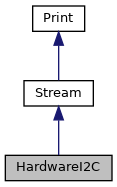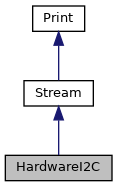|
| | HardwareI2C (I2C_HandleTypeDef &hi2c_) |
| |
| bool | instanceExists (void) |
| | Checks if I2C instance exists. More...
|
| |
| bool | isMaster (void) |
| |
| void | setTimeout (uint32_t timeout_) |
| |
| uint32_t | errorCode (void) |
| |
| bool | begin (uint8_t adress1, uint8_t adress2=0) |
| |
| bool | begin () |
| |
| bool | end () |
| |
| void | setClock (uint32_t) |
| |
| void | setClockStretchLimit (uint32_t) |
| |
| bool | beginTransmission (uint16_t address, uint32_t bytesCountToSend) |
| |
| bool | beginTransmission (int address, uint32_t bytesCountToSend) |
| |
| uint8_t | endTransmission (void) |
| |
| uint8_t | endTransmission (uint8_t) |
| |
| uint8_t | requestFrom (uint8_t address, size_t size, bool sendStop) |
| |
| uint8_t | status () |
| |
| uint8_t | requestFrom (uint8_t, uint8_t) |
| |
| uint8_t | requestFrom (uint8_t, uint8_t, uint8_t) |
| |
| uint8_t | requestFrom (int, int) |
| |
| uint8_t | requestFrom (int, int, int) |
| |
| size_t | write (uint8_t) override |
| | Writes one unsigned byte (character). More...
|
| |
| size_t | write (const uint8_t *, size_t) override |
| | Writes byte array (string). More...
|
| |
| int | available (void) override |
| | Checks how many bytes are available in receiving buffer. More...
|
| |
| int | read (void) override |
| | Reads one byte from receiving buffer and removes it from buffer. More...
|
| |
| int | peek (void) override |
| | Reads one byte from receiving buffer and without removing it from buffer. More...
|
| |
| void | flush (void) |
| |
| void | onReceive (void(*function)(int)) |
| |
| void | onReceive (void(*function)(size_t)) |
| |
| void | onRequest (void(*)(void)) |
| |
| | Stream () |
| | Constructor. More...
|
| |
| Stream & | operator>> (char &c) |
| | This operator (>>) applied to an input stream is known as extraction operator, it can be used same as cin>> operator. More...
|
| |
| Stream & | operator>> (char *buffer) |
| | This operator (>>) applied to an input stream is known as extraction operator, it can be used same as cin>> operator. More...
|
| |
| Stream & | operator>> (uint8_t *buffer) |
| | This operator (>>) applied to an input stream is known as extraction operator, it can be used same as cin>> operator. More...
|
| |
| | __INTEGER_ONLY__ (T, Stream &) operator>>(T &val) |
| | This operator (>>) applied to an input stream is known as extraction operator, it can be used same as cin>> operator. More...
|
| |
| | __FLOATING_ONLY__ (T, Stream &) operator>>(T &val) |
| | This operator (>>) applied to an input stream is known as extraction operator, it can be used same as cin>> operator. More...
|
| |
| void | setTimeout (unsigned long timeout) |
| | Sets the maximum milliseconds to wait for data transmitting or receiving. More...
|
| |
| virtual void | width (size_t width_) |
| | Sets receiving width, that is applied when using operators >> (same as cin.width() method). More...
|
| |
| bool | find (const char *target) |
| | Reads and removes data from the stream until the target string is found. More...
|
| |
| bool | find (uint8_t *target) |
| | Reads and removes data from the stream until the target string is found. More...
|
| |
| bool | find (const char *target, size_t length) |
| | Reads and removes data from the stream until the target string is found. More...
|
| |
| bool | find (const uint8_t *target, size_t length) |
| | Reads and removes data from the stream until the target string is found. More...
|
| |
| bool | find (char target) |
| | Reads and removes data from the stream until the target character is found. More...
|
| |
| bool | findUntil (const char *target, const char *terminator) |
| | Reads data from the stream until a target string or terminator string is found. More...
|
| |
| bool | findUntil (const uint8_t *target, const char *terminator) |
| | Reads data from the stream until a target string or terminator string is found. More...
|
| |
| bool | findUntil (const char *target, size_t targetLen, const char *terminate, size_t termLen) |
| | Reads data from the stream until a target string or terminator string is found. More...
|
| |
| bool | findUntil (const uint8_t *target, size_t targetLen, const char *terminate, size_t termLen) |
| | Reads data from the stream until a target string or terminator string is found. More...
|
| |
| long | parseInt () |
| | Parses the first valid (long) integer number from the stream. More...
|
| |
| | __INTEGER_ONLY__ (T, T) inline parseNum() |
| | Parses the first valid integer number from the stream. More...
|
| |
| float | parseFloat () |
| | Parses the first valid floating point number from the stream. More...
|
| |
| | __FLOATING_ONLY__ (T, T) inline parseNum() |
| | Parses the first valid floating point number from the stream. More...
|
| |
| virtual size_t | readBytes (char *buffer, size_t length) |
| | Reads characters from the stream into a buffer. More...
|
| |
| virtual size_t | readBytes (uint8_t *buffer, size_t length) |
| | Reads characters from the stream into a buffer. More...
|
| |
| size_t | readBytesUntil (char terminator, char *buffer, size_t length) |
| | Reads characters from the stream into a buffer. More...
|
| |
| size_t | readBytesUntil (char terminator, uint8_t *buffer, size_t length) |
| | Reads characters from the stream into a buffer. More...
|
| |
| | Print () |
| | Constructor. More...
|
| |
| int | getWriteError () |
| | Gets write error. More...
|
| |
| void | clearWriteError () |
| | Clears write error. More...
|
| |
| size_t | write (const char *str) |
| | Writes character array (string). More...
|
| |
| size_t | write (const char *buffer, size_t size) |
| | Writes character array (string). More...
|
| |
| | __INTEGER_ONLY__ (T, size_t) inline write(T val) |
| | Converts integer type variable to unsigned byte and writes it. More...
|
| |
| virtual int | availableForWrite () |
| | Gets how many bytes can be written, meaning "a single write may block". More...
|
| |
| size_t | printf (const char *format,...) __attribute__((format(printf |
| | Prints formatted data. More...
|
| |
| size_t size_t | print (const String &s) |
| | Prints string. More...
|
| |
| size_t | print (const char str[]) |
| | Prints character array (string). More...
|
| |
| size_t | print (char c) |
| | Prints one character. More...
|
| |
| | __SIGNED_INTEGER_ONLY__ (T, size_t) print(T n |
| | Converts integer number to character array and prints it. More...
|
| |
| size_t | println (const String &s) |
| | Prints string followed by carriage return and new line. More...
|
| |
| size_t | println (const char[]) |
| | Prints character array (string) followed by carriage return and new line. More...
|
| |
| size_t | println (char) |
| | Prints one character followed by carriage return and new line. More...
|
| |
| | __INTEGER_ONLY__ (T, size_t) inline println(T n |
| | Converts integer number to character array followed by carriage return and new line and prints it. More...
|
| |
| size_t | println (void) |
| | Prints carriage return and new line. More...
|
| |
| template<class T > |
| Print & | operator<< (T value) |
| | This operator (<<) applied to an output stream is known as insertion operator, it can be used same as cout<< operator. More...
|
| |




 Public Member Functions inherited from Stream
Public Member Functions inherited from Stream Public Member Functions inherited from Print
Public Member Functions inherited from Print Public Attributes inherited from Print
Public Attributes inherited from Print Protected Member Functions inherited from Stream
Protected Member Functions inherited from Stream Protected Member Functions inherited from Print
Protected Member Functions inherited from Print Protected Attributes inherited from Stream
Protected Attributes inherited from Stream












